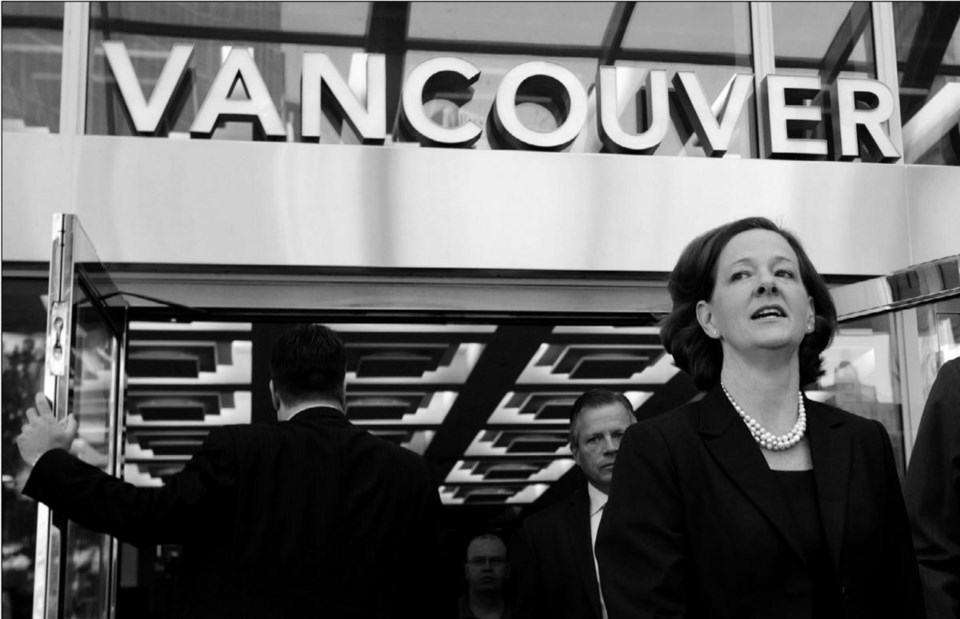If the past month has been a cooling off period for B.C. and Alberta in the heated dispute over royalties from the proposed Northern Gateway pipeline, relations may be turning downright icy.
Alberta Premier Alison Redford was in Christy Clark's backyard on Tuesday and reiterated that she has not and will not be meeting with her B.C. counterpart to discuss any sharing of Albertan royalties from the proposed multibillion-dollar pipeline project.
"She made her position very clear. Ours is very clear - our position hasn't changed," Redford told reporters following a speech to the Canadian Bar Association.
"We believe that it's very important for economic benefits to be spread across the country and we don't believe that fundamentally changing Confederation to allow that to happen is appropriate, and so wouldn't entertain any discussion with respect to sharing of Alberta royalties."
A spokesman for Clark said the B.C. premier is on vacation. Redford's appearance at the legal conference was booked in May, well before Clark sparked the dispute with a list of criteria for B.C.'s support for the pipeline proposed by Calgary-based Enbridge that included a greater share of royalties.
The B.C. Liberal leader underscored the demand by walking out of a discussion on a national energy strategy at the Council of the Federation meeting last month.
In a speech that made no direct mention of Northern Gateway or the dispute between the two provinces, Redford championed a unified approach to Canada's economic future, in what appeared to be a subtle rebuke of the B.C. position.
"We need to ensure that our actions are fiscally responsible and fair, not only to this generation but to those who follow, and this means doing what's right for the long term and not the next election cycle."
Clark is set to go to the polls on May 14, 2013, in a province where the pipeline project has deeply divided the public.
The proposal by Enbridge would see twin pipelines deliver diluted bitumen over 1,170 kilometres from the oilsands in northern Alberta to a terminal to be built for tankers near Kitimat. A federal environmental review panel has until Dec. 31, 2013, to complete its review.
Asked after her speech how the impasse can be resolved if the two leaders do not meet, Redford said she was sure that, at some point in the future, the two will meet, but there are no plans as yet.
"We have every other premier across this country understanding the importance of an energy economy and understanding that it's important for all Canadians that we do work together," Redford said.
It is entirely appropriate for British Columbians to have a discussion about whether the Northern Gateway project is right for their province, she said.
"What I've been saying as the premier of Alberta is it's important for us all as political leaders to work together to ensure that there is access to international markets and that there isn't any particular province that should get more access or less access to international markets based on their geographic location," Redford said.
A spokesman for Clark, Mike Morton, said the premier was not available to comment on Redford's remarks, but that B.C.'s position has not changed.
"Our position is still that the ball is in Alberta's court. We laid out our five principles in Halifax and that stands today," Morton said.
B.C. will receive about $6 billion of an estimated $81 billion in tax revenue over the 30 years of the project. Ottawa is expected to receive about $36 billion and Alberta $32 billion.
In her speech, Redford said she continues to work with provincial and territorial leaders toward a national energy strategy, and she warned against tying such a strategy to a single project.
"Market access must be a part of that because it's a national imperative that's essential to Canada's economic health. It just doesn't make sense to have only one market for your biggest export, and it also doesn't make much sense for any-one, or any province, or any jurisdiction, to go it alone."



